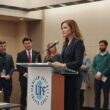Nearly Half of Pupils Don’t Speak German as First Language
A concerning trend has emerged in Vienna’s schools, with nearly half of pupils not speaking German as their first language, and a staggering 45% of the youngest students having a “special status” that documents their limited German proficiency.
These numbers not only raise questions about integration but also the efficiency of education policy.
A Generation of Language Deficits?
The high proportion of children with Arabic or Turkish as their first language is particularly alarming.
In Vienna’s primary schools, the percentage of students who don’t speak German in everyday life stands at a record 65%. Many of these children were born in Austria and have attended kindergarten for several years.
Why isn’t this time enough for them to acquire basic German skills?
Since 2018, German support classes and courses have offered up to 20 hours of intensive language instruction. However, progress remains limited. Critics argue that the system contributes more to segregation than integration.
Children in these support classes often feel isolated and struggle to adjust to regular classes.
The controversial MIKA-D test, which measures German proficiency, is also under fire, with critics arguing it’s not suitable for evaluating actual language skills and pushes many children too early into support programs.
Family reunification, particularly from Syria, has further exacerbated the situation. Between 2023 and 2024, around 3,600 new students arrived in Vienna’s schools every month, many with no prior school experience.
While orientation classes were introduced for this group, it’s unclear if two months of intensive language instruction are enough to prepare them for regular school life.
The majority of children with “special status” were born in Austria, suggesting the problem is not solely due to migration, but also to shortcomings in early childhood language support.
While the government focuses on quick fixes, often missing are sustainable strategies that also involve parents and value the children’s native languages.
The current situation in Vienna’s schools presents a challenge for the entire education system. Without basic German skills, a whole generation of students risks being left behind. However, instead of offering real solutions, existing measures often exacerbate the problems. It’s time for a genuine political discourse and bold decisions to enable genuine integration – for students, parents, and the education system as a whole.
Time is of the essence, as language deficits today will be the social and economic problems of tomorrow.





